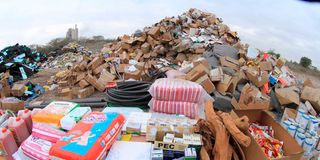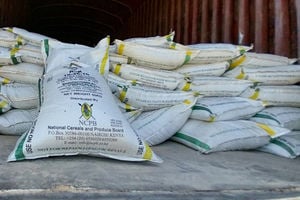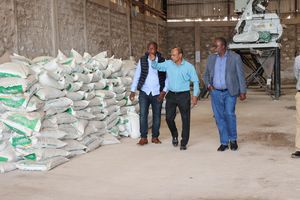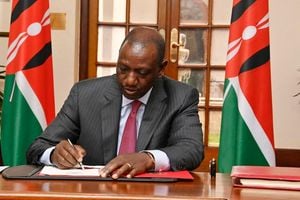
Pile of counterfeit goods. The fake fertiliser is part of a multi-billion shilling illicit trade estimated to be worth over Sh1 trillion.
The recent scandal over the sale of fake fertiliser to farmers has shed fresh light on the booming trade in substandard, counterfeit, contraband and unregulated goods that are leaving consumers, businesses and the government counting losses.
The fake fertiliser is part of a multi-billion-shillings illicit trade that the Anti-Counterfeit Authority (ACA), the State agency tasked with stopping the trade, estimates has crossed the Sh1 trillion mark in value.
Yet top government officials have in recent weeks engaged in a blame game over the extent of the fake fertiliser, which threatens the country’s food security at a time President William Ruto has pumped billions of shillings into the subsidy to increase crop yields.
On Thursday, while appearing before Parliament, Agriculture Cabinet Secretary Mithika Linturi dismissed claims that the subsidised fertiliser was fake.
Instead, he clarified that part of the subsidised fertiliser sold to farmers through the National Cereals and Produce Board (NCPB) was only substandard, after failing to meet the Kenya Bureau of Standards (Kebs) requirements.
The CS said that a probe has been launched and that affected farmers will be compensated after the probe is completed and verification made.
“Kebs and all the agencies did their tests to confirm quality. The issue here is that we have one unfaithful manufacturer who by error of omission or commission passed 3,000 bags of fertilisers that did not conform to the standards,” said Mr Linturi. The number of bags affected, however, remains unclear with contradictory figures provided.
According to the American Foreign Service Association (Afsa), illicit trade consists of both tangible goods — alcohol, drugs, human beings, weapons, wildlife and timber, fish, antiquities and ubiquitous counterfeits — and intangible goods bought and sold in cyberspace, such as passwords, botnets and malware.
Due to the prevalence of illicit trade, it is safe to assume that most Kenyans have at one point or another bought, consumed or interacted with a counterfeited product.
In Kenya, Kariobangi, a sprawling low-income residential area in Nairobi’s north-east accessible via both the Thika Superhighway and the Outering Road, has become synonymous with counterfeits. The area is home to all manner of businesses, majority of which are legitimate, but harbours a huge chunk of unscrupulous dealers who make a vast array of knockoffs, especially alcohol, soft drinks and chemicals.
Nairobi’s Industrial Area is also a magnet for such businesses which camouflage in the thousands of legitimate businesses that operate there, and increasingly, Kamakis in Ruiru where the government has recently impounded tonnes of fake milk powder.
Other illicit goods are smuggled into Kenya from its neighbours – Uganda, Tanzania, Somalia, Ethiopia and South Sudan - through various porous border points.
According to the National Baseline Survey on Counterfeit and Other Forms of Illicit Trade in Kenya released in 2021 by ACA, the total value of illicit trade was Sh826 billion in 2018, a 14 percent increase from Sh726 billion in 2017.
In terms of their GDP share, this represents an increase from 8.9 percent in 2017 to 9.3 percent in 2018. Currently, ACA estimates that the numbers have hit more than Sh1 trillion this year.
According to ACA, the State lost an estimated Sh153.1 billion in revenue in 2018 due to counterfeits. This has led to a stronger push by the government in recent years to combat illicit trade.
The Kenya Association of Manufacturers (KAM) – a lobby representing hundreds of manufacturers from various sectors - says that Fast-Moving Consumer Goods (FMCGs) such as food and beverages, tobacco, chemicals, pharmaceuticals and electronics are the most counterfeited items.
KAM says that a study it undertook in 2012 showed that genuine manufacturers lost 40 percent of the market as counterfeits, which are often cheaper, ate into the market share of genuine products.
BAT Kenya, a leading manufacturer of cigarettes and which is listed on the Nairobi securities Exchange (NSE), says that booming illicit trade in cigarettes, that is the smuggling of tax-evaded cigarettes from neighbouring countries, accounted for about 26 percent of the market in 2022.
“Consequently, shrinkage of the legitimate market continues to impact industry and deny government an estimated Sh6.5 billion in annual taxes,” it said.
According to the company, curbing illicit cigarettes trade requires the lowering of taxes on the commodity especially excise duty, as well as collaboration between Kenya and East African Community member states for monitoring and enforcement.
Due to their cheaper cost relative to genuine products, counterfeits are popular among buyers who are seeking bargains. It’s this price sensitivity that is forcing manufacturers to come up with cheaper alternatives that can be accessed by the price-conscious buyer.
The alcohol industry is one of the most heavily affected by the consumption of illicit brews, which has led to a recent crackdown by the government.
As a result, leading alcohol manufacturer, the East African Breweries Limited (EABL), has noted that by introducing cheap alternatives, it will not only retain buyers but also lessen the attractiveness of cheap liquors.
“The generalised economic downturn and inflationary pressure, has led to resurgence in illicit trade as consumers move away from our brands to alternative products,” said the brewer in its 2023 annual report.
In 2004, the brewer introduced the popular Senator Keg beer as a response to the issue of illicit liquor in Kenya.
“We continue to innovate at scale to provide safe and accessible alternatives to our value driven consumers.”
KAM says FMCGs are targeted for counterfeiting because they are in high demand, rake in huge profits, and have complex supply chains involved in manufacturing and distribution, creating a loopholes for counterfeits to infiltrate the chain. “It is crucial to ensure consistent enforcement measures against the influx of imported counterfeit goods, considering that over 70 percent of counterfeit products in our market originate from imported sources.”
Seeds, particularly of popular crops such as maize, beans and peas, are some of the most counterfeited products in the country.










